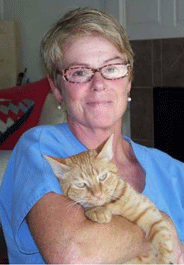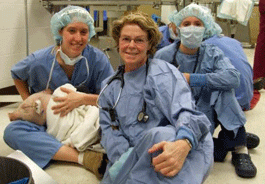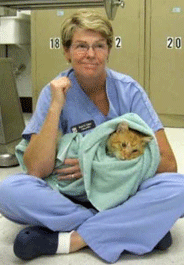UGA Veterinary Students and Faculty Join Forces to Promote Humane Veterinary TrainingJune 8, 2009 By Ruth D. Usher  Ruth Usher, pictured with her cat "Laser", took a leadership role in developing alternatives in her school's surgery curriculum. In May 2008, as I was finishing my freshman year at the University of Georgia - College of Veterinary Medicine, I looked at what the upcoming sophomore curriculum would encompass. I was excited to begin my first surgery course the following spring and found that most of the procedures were recovery surgeries or involved practicing suturing techniques on donated equine cadaver organs. There was one terminal canine procedure, which gave me pause for thought—I had ethical concerns about performing a terminal surgery. What could I do to avoid this? Were there other students who secretly felt the same way? Would I be reprimanded if I approached the faculty about my ethical concerns? How Do the Curriculums Compare?I researched options offered at other veterinary colleges and discovered that many colleges had completely eliminated terminal surgery procedures in either their core or elective curriculum, or both. Some colleges still conducted terminal procedures, but offered an alternative curriculum with canine cadavers. I read about the efficacy of alternative surgery curriculums as teaching tools, finding articles in several veterinary journals¹ ². It seemed that student results achieved with the alternative method of instruction were either not significantly different from or superior to results associated with the conventional teaching method. Encouraged by this, I approached several of the surgery faculty to discuss alternative teaching opportunities within our curriculum and was informed that UGA-CVM did have an alternative surgery policy—established over ten years ago—for students who elected not to perform terminal procedures. The surgery faculty further explained that a wide majority of students historically expressed that the terminal procedure was an important learning experience and thus chose it over the alternative curriculum. I found this to be true later when I entered sophomore surgery. Educational Memorial ProgramsWhile researching alternative surgery programs at other colleges, I discovered many of these programs utilized willed or donated canine cadaver bodies. I discussed this with another student, Shirin Modaresi, president of our Animal Welfare Club at that time. She told me about Educational Memorial Programs (EMP), or willed donor body programs, and recommended we pursue implementing such a program at UGA-CVM. The large animal department at our College already had a willed body donor program in place, so the establishment of a small animal EMP seemed logical.
As Shirin had indicated that HSVMA was a good resource for starting an EMP, we contacted them and were pleased to find they could provide many resources and contacts. We wrote our proposal and made our first EMP presentation during a student/faculty EMP committee meeting in the summer of 2008. The biggest obstacle to implementing our plan was insufficient freezer space to accommodate the donated cadavers, but in late 2008, HSVMA generously provided a $2,000 grant to help purchase new freezers. We have since identified the freezers we'd like to acquire, determined a needs assessment between departments as well as sources for willed cadavers, and developed standard operating procedures, donor release forms and thank you letters. An EMP brochure is also in development. The pieces should all come together to establish the EMP in time for the 2009 fall semester. Shelter Medicine Programs Ruth Usher and a few veterinary classmates in recovery after a successful surgical procedure. I also discovered several colleges with alternative surgery curriculums had Shelter Medicine Programs (SMP), which included a fourth-year spay/neuter rotation. Several other students and I met with faculty and administration members over the summer of 2008 to explore the prospect of introducing similar programs at UGA-CVM and find ways to improve the current surgery curriculum. We found that the college had been interested in developing a SMP several years earlier, but hadn't thought there was enough student interest at that time. Now, with a solid base of student interest and receptive faculty and administrators, we were able to form committees to examine these and other alternatives. The Shelter Medicine Program is moving forward. We have received more funding to support a fourth-year senior spay/neuter rotation and have partnered with an adoption-guarantee shelter for this rotation. Faculty will begin work this summer on writing several grants to finance the start-up of the program until it becomes self-sustainable. In addition, the College sponsored its first Shelter Medicine seminar for shelter personnel this past January, with more than 80 attendees from many shelters across a wide geography within Georgia; we plan to repeat it next year and offer several wet labs. We also offered our first shelter medicine-related didactic course on forensics this semester and another course on shelter medicine will be offered next year, covering small animal herd management, disease prevention and other topics. Looking Ahead Ruth Usher helped nurse "Ben", a sick cat from a local humane society, back to health after his surgery, likely increasing his chances of being adopted into a loving home. In addition to developing these programs for our surgery curriculum, we wrote grants for the College to fund a DVD/digital media library of non-terminal surgical procedures for sophomore and junior surgery courses and were pleased to receive a grant from Animalearn for the project in late 2008. Filming is scheduled to begin this month, and we expect the DVDs to be completed in time for the fall 2009 semester. For the 2008-2009 junior and sophomore surgery labs, four students from both classes chose the option of performing surgery on a canine cadaver over the option of a terminal procedure. This significant finding indicates that the challenge in reducing animal use in surgical labs lies heavily with students, convincing them that their educational experience will not be compromised. In the end, none of the animal welfare initiatives or progress could have come about without the support of UGA-CVM's faculty members, a talented and generous group who share a sincere passion and enthusiasm for the medicine they practice and teach. I have learned so much through my work with them on these issues and would encourage any student who is interested in animal welfare at their college to initiate discussions with their faculty and administration. Ruth D. Usher is a veterinary student at the University of Georgia-College of Veterinary Medicine. She will graduate in 2011. ¹ Daniel D. Smeak, "Teaching Veterinary Students Using Shelter Animals," Journal of Veterinary Medical Education 35 no. 1, (Spring 2008), 26. |
